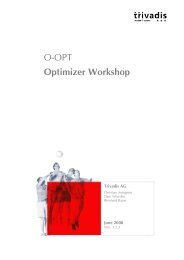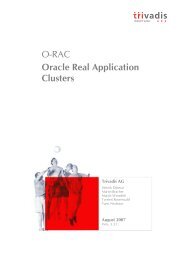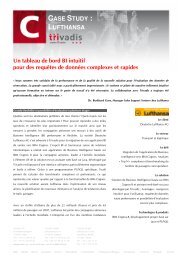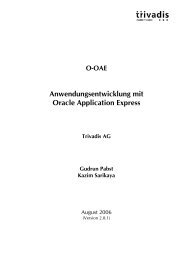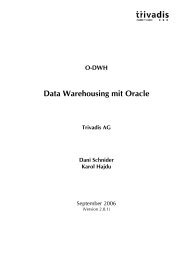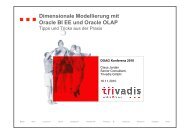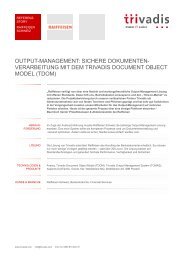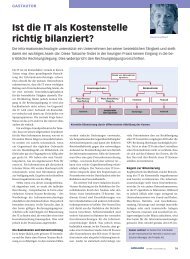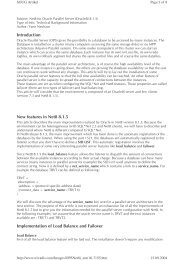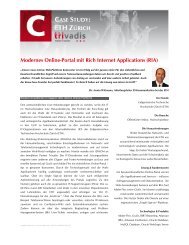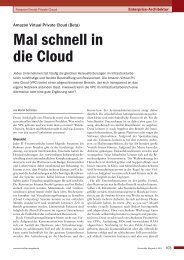Millsap's Grand Unified Theory of “Tuning” - Trivadis
Millsap's Grand Unified Theory of “Tuning” - Trivadis
Millsap's Grand Unified Theory of “Tuning” - Trivadis
Create successful ePaper yourself
Turn your PDF publications into a flip-book with our unique Google optimized e-Paper software.
Millsap’s <strong>Grand</strong> <strong>Unified</strong><br />
<strong>Theory</strong> <strong>of</strong> <strong>“Tuning”</strong><br />
Cary Millsap<br />
cary.millsap@method-r.com<br />
<strong>Trivadis</strong>OPEN 2008<br />
Zürich, Switzerland<br />
14.30–15.45 Tuesday 21 October 2008<br />
Copyright © 2008 by Method R Corporation
Cary Millsap
http://method-r.com<br />
http://carymillsap.blogspot.com<br />
cary.millsap@method-r.com
Millsap’s <strong>Grand</strong> <strong>Unified</strong><br />
<strong>Theory</strong> <strong>of</strong> <strong>“Tuning”</strong><br />
Cary Millsap<br />
cary.millsap@method-r.com<br />
<strong>Trivadis</strong>OPEN 2008<br />
Zürich, Switzerland<br />
14.30–15.45 Tuesday 21 October 200<br />
Copyright © 2008 by Method R Corporation
So what's with the<br />
quotes?
Millsap’s <strong>Grand</strong> <strong>Unified</strong><br />
<strong>Theory</strong> <strong>of</strong> <strong>“Tuning”</strong><br />
Cary Millsap<br />
cary.millsap@method-r.com<br />
O O<br />
<strong>Trivadis</strong>OPEN 2008<br />
Zürich, Switzerland<br />
14.30–15.45 Tuesday 21 October 2008<br />
Copyright © 2008 by Method R Corporation
We'll get to that<br />
shortly
Part 1: G.U.T.
There are two types <strong>of</strong><br />
performance problems in<br />
this world...
1 <br />
Response time <br />
problems.
2 <br />
Inef3iciencies that aren’t <br />
response time problems. <br />
Yet.
Therefore...
G.U.T. proposition l<br />
You must be able to attack <br />
response time problems for <br />
speci3ic tasks that the <br />
business cares about.
Example...
Posting hurts.<br />
Fix it.
Why should you care?
G.U.T. proposition 2<br />
You need to be able to attack <br />
inef3iciencies that aren’t yet <br />
noticeable as user response <br />
time problems.
Example...
Posting takes 3 hours.<br />
It should take 2,<br />
but no user really cares.
Why should *you* care?
Because<br />
waste<br />
costs you money
Waste<br />
Hardware $$<br />
Labor $$<br />
S<strong>of</strong>tware $$<br />
TCO $$
And waste...
...Makes<br />
other work<br />
go slower
...Even your<br />
fast stuff
ecap...
G.U.T. propositions<br />
You must be able to attack <br />
1. Response time problems <br />
2. Ef3iciency problems
Part 2: Historical perspective
In the beginning...
1989<br />
6.0.26
<strong>“Tuning”</strong> was...
stat.sql + estat.sql<br />
=<br />
report.txt
People looked for<br />
“bad numbers”
Inefficiencies
But how can you know<br />
what causes a specific<br />
task to be slow?
My problem...
How can you possibly<br />
KNOW<br />
that?
Reminded me <strong>of</strong>...
You (do( see it...<br />
Right?
But who says<br />
that<br />
is what you<br />
have to see?
Why not?
The problem with<br />
bstat/estat, ...
and<br />
utlbstat/utlestat, ...
and statspack, ...
And Even AWR, ...
Sometimes You<br />
can't<br />
know
example...
What is your task's<br />
problem?
Latche<br />
s<br />
Resource consumption (seconds) by task<br />
Total system<br />
7,502 74%<br />
I/O 275 3%<br />
Other 2,323 23%<br />
Total 10,100<br />
100<br />
%
Actually not
Latche<br />
s<br />
Resource consumption (seconds) by task<br />
Total system Your task<br />
7,502 74% 2 2%<br />
I/O 275 3% 75 75%<br />
Other 2,323 23% 23 23%<br />
Total 10,100<br />
100<br />
%<br />
100<br />
100<br />
%
Here's how it happens
Latche<br />
s<br />
Resource consumption (seconds) by task<br />
Total system Your task Other tasks<br />
7,502 74% 2 2% 7,500 75%<br />
I/O 275 3% 75 75% 200 2%<br />
Other 2,323 23% 23 23% 2,300 23%<br />
Total 10,100<br />
100<br />
%<br />
100<br />
100<br />
% 10,000<br />
100<br />
%
It *does* happen...
Sometimes You<br />
can't<br />
know
...Until you<br />
look at the right<br />
“it”
Latche<br />
s<br />
Resource consumption (seconds) by task<br />
Total system Your task Other tasks<br />
7,502 74% 2 2% 7,500 75%<br />
I/O 275 3% 75 75% 200 2%<br />
Other 2,323 23% 23 23% 2,300 23%<br />
Total 10,100<br />
100<br />
%<br />
100<br />
100<br />
% 10,000<br />
100<br />
%
When you don't...
An epiphany...
1991<br />
(Oracle release doesn’t matter)
Huh?
Imagine...<br />
Q1 and Q2 return<br />
identical results
Which is better?
You can't count<br />
on the ratios!
The rules in a lot <strong>of</strong><br />
people's heads...
Were wrong.
Another man who<br />
knew this...
But how?
tkpr<strong>of</strong>
An Oracle<br />
developer tool<br />
since v6
It's what you need...
(if(<br />
your problem<br />
is sql
And <strong>of</strong> course,<br />
“the problem is<br />
always SQL”
Next...<br />
Inspiration
1995<br />
Oracle7
My goal...
Put this in a bottle.
Which brings me back<br />
to those “quotes”
Millsap’s <strong>Grand</strong> <strong>Unified</strong><br />
<strong>Theory</strong> <strong>of</strong> <strong>“Tuning”</strong><br />
Cary Millsap<br />
cary.millsap@method-r.com<br />
O O<br />
<strong>Trivadis</strong>OPEN 2008<br />
Zürich, Switzerland<br />
14.30–15.45 Tuesday 21 October 2008<br />
Copyright © 2008 by Method R Corporation
The problem...
<strong>“Tuning”</strong> isn't good<br />
enough
Tuning What we want<br />
Make some<br />
component faster<br />
Maximize economic<br />
value
Tuning What we want<br />
Make some<br />
component faster<br />
Maximize economic<br />
value<br />
Trial and error Informed action
Tuning What we want<br />
Make some<br />
component faster<br />
Maximize economic<br />
value<br />
Trial and error Informed action<br />
Weak accountability<br />
Accountability to<br />
forecast
Tuning What we want<br />
Make some<br />
component faster<br />
Maximize economic<br />
value<br />
Trial and error Informed action<br />
Weak accountability<br />
Success measured by<br />
effort<br />
Accountability to<br />
forecast<br />
Success measured by<br />
results
Tuning ?<br />
Make some<br />
component faster<br />
Maximize economic<br />
value<br />
Trial and error Informed action<br />
Weak accountability<br />
Success measured by<br />
effort<br />
Accountability to<br />
forecast<br />
Success measured by<br />
results
Tuning *** Optimization ***<br />
Make some<br />
component faster<br />
Maximize economic<br />
value<br />
Trial and error Informed action<br />
Weak accountability<br />
Success measured by<br />
effort<br />
Accountability to<br />
forecast<br />
Success measured by<br />
results
Tuning Optimization<br />
Make some<br />
component faster<br />
Maximize economic<br />
value<br />
Trial and error Informed action<br />
Weak accountability<br />
Success measured by<br />
effort<br />
Accountability to<br />
forecast<br />
Success measured by<br />
results
Part 3: How
The goal...<br />
Optimization! ...in a bottle
2000<br />
8i, 9i
Wanted...
Repeatable<br />
Teachable
method<br />
=<br />
deterministic"<br />
sequence <strong>of</strong> steps
There (were(<br />
methods...
Oracle Performance Improvement Method<br />
1. Get candid feedback from users<br />
2. Get full set <strong>of</strong> OS, db, app statistics—good and bad<br />
3. Sanity check the OS<br />
4. Review Top Ten list*<br />
5. Build conceptual model<br />
6. Propose remedies<br />
7. Validate changes<br />
8. Repeat until goals are met or become impossible<br />
http://download.oracle.com/docs/cd/B28359_01/server.111/b28274/technique.htm
Oracle Performance Improvement Method<br />
1. Get candid feedback from users<br />
2. Get full set <strong>of</strong> OS, db, app statistics—good and bad<br />
3. Sanity check the OS<br />
4. Review Top Ten list*<br />
5. Build conceptual model<br />
6. Propose remedies<br />
7. Validate changes<br />
8. Repeat until goals are met or become impossible<br />
http://download.oracle.com/docs/cd/B28359_01/server.111/b28274/technique.htm
*The OPIM Top Ten list<br />
1. Bad connection management<br />
2. Bad use <strong>of</strong> cursors and the shared pool<br />
3. Bad SQL<br />
4. Use <strong>of</strong> nonstandard initialization parameters<br />
5. Getting database I/O wrong<br />
6. Redo log setup problems<br />
7. Serialization <strong>of</strong> data blocks<br />
8. Long full table scans<br />
9. High amounts <strong>of</strong> recursive SQL<br />
10. Deployment and migration errors<br />
http://download.oracle.com/docs/cd/B28359_01/server.111/b28274/technique.htm
But there were Two<br />
big problems...
*The OPIM Top Ten list<br />
1. Bad connection management<br />
2. Bad use <strong>of</strong> cursors and the shared pool<br />
3. Bad SQL<br />
What if your problem is<br />
4. Use <strong>of</strong> nonstandard initialization parameters<br />
5. Getting database I/O wrong<br />
6. Redo log setup problems<br />
7. Serialization <strong>of</strong> data blocks<br />
8. Long full table scans<br />
number nine?<br />
9. High amounts <strong>of</strong> recursive SQL<br />
10. Deployment and migration errors<br />
http://download.oracle.com/docs/cd/B28359_01/server.111/b28274/technique.htm
*The OPIM Top Ten list<br />
1. Bad connection management<br />
2. Bad use <strong>of</strong> cursors and the shared pool<br />
do you really want to<br />
3. Bad SQL<br />
4. Use <strong>of</strong> nonstandard initialization parameters<br />
spend time checking the<br />
5. Getting database I/O wrong<br />
6. Redo log setup problems<br />
7. Serialization <strong>of</strong> data blocks<br />
8. Long full table scans<br />
first eight?<br />
9. High amounts <strong>of</strong> recursive SQL<br />
10. Deployment and migration errors<br />
http://download.oracle.com/docs/cd/B28359_01/server.111/b28274/technique.htm
*The OPIM Top Ten list<br />
1. Bad connection management<br />
2. Bad use <strong>of</strong> cursors and the shared pool<br />
3. Bad SQL<br />
...And What if your<br />
4. Use <strong>of</strong> nonstandard initialization parameters<br />
5. Getting database I/O wrong<br />
6. Redo log setup problems<br />
7. Serialization <strong>of</strong> data blocks<br />
8. Long full table scans<br />
problem is<br />
number eleven?<br />
9. High amounts <strong>of</strong> recursive SQL<br />
10. Deployment and migration errors<br />
http://download.oracle.com/docs/cd/B28359_01/server.111/b28274/technique.htm
*The OPIM Top Ten list<br />
1. Bad connection management<br />
2. Bad use <strong>of</strong> cursors and the shared pool<br />
3. Bad SQL<br />
4. Use <strong>of</strong> nonstandard initialization parameters<br />
5. Getting database I/O wrong<br />
6. Redo log setup problems<br />
7. Serialization <strong>of</strong> data blocks<br />
8. Long full table scans<br />
9. High amounts <strong>of</strong> recursive SQL<br />
10. Deployment and migration errors<br />
http://download.oracle.com/docs/cd/B28359_01/server.111/b28274/technique.htm
It's like a<br />
full table scan
...<strong>of</strong> a table that's<br />
missing some rows
What we need...
An (index( into the<br />
problem you're having<br />
right now...
...Whose (key( is the<br />
name <strong>of</strong> your<br />
business task
+ =
Method R <br />
1. Target the right task <br />
2. Collect its R details <br />
3. Forecast, act <br />
4. Repeat until optimized
Latche<br />
s<br />
Resource consumption (seconds) by task<br />
Total system Your task Other tasks<br />
7,502 74% 2 2% 7,500 75%<br />
I/O 275 3% 75 75% 200 2%<br />
Other 2,323 23% 23 23% 2,300 23%<br />
Total 10,100<br />
100<br />
%<br />
100<br />
100<br />
% 10,000<br />
100<br />
%
Oracle extended SQL<br />
trace data
Meanwhile, back at<br />
Oracle Corporation...
Easier, better access to<br />
system workload<br />
statistics
Active session history ...ASH
The task perspective...
Latche<br />
s<br />
Resource consumption (seconds) by task<br />
Total system Your task Other tasks<br />
7,502 74% 2 2% 7,500 75%<br />
I/O 275 3% 75 75% 200 2%<br />
Other 2,323 23% 23 23% 2,300 23%<br />
Total 10,100<br />
100<br />
%<br />
100<br />
100<br />
% 10,000<br />
100<br />
%
Latche<br />
s<br />
Resource consumption (seconds) by task<br />
Total system Your task Other tasks<br />
7,502 74% 2 2% 7,500 75%<br />
I/O 275 3% 75 75% 200 2%<br />
Other 2,323 23% 23 23% 2,300 23%<br />
Total 10,100<br />
100<br />
%<br />
100<br />
100<br />
% 10,000<br />
100<br />
%
How it all fits...
The grand<br />
unified<br />
theory
G.U.T. proposition l<br />
You must be able to attack <br />
response time problems for <br />
speci3ic tasks that the <br />
business cares about.
trace data
Where does this task's<br />
time go?
ASH<br />
answers questions about<br />
workload context
Who had my lock?<br />
Who had my latch?<br />
Who was eating my CPU?<br />
Who was fighting me for disk?
G.U.T. proposition 2<br />
You need to be able to attack <br />
inef3iciencies that aren’t yet <br />
noticeable as user response <br />
time problems.
ASH
Who's using the most stuff?
trace data<br />
answers questions about<br />
task efficiency
Can this task be performed<br />
more efficiently?
Almost impossible to<br />
prove without<br />
task data
You don't<br />
have to trace<br />
everything
...You can *sample*<br />
with traces, too
Trace *some* tasks
How the<br />
data sources<br />
fit together...
Response time<br />
problem<br />
1. Trace data<br />
2. ASH data<br />
Efficiency<br />
problem<br />
1. ASH data<br />
2. Trace data
Thank you
http://wordle.net
http://method-r.com<br />
http://carymillsap.blogspot.com<br />
cary.millsap@method-r.com




